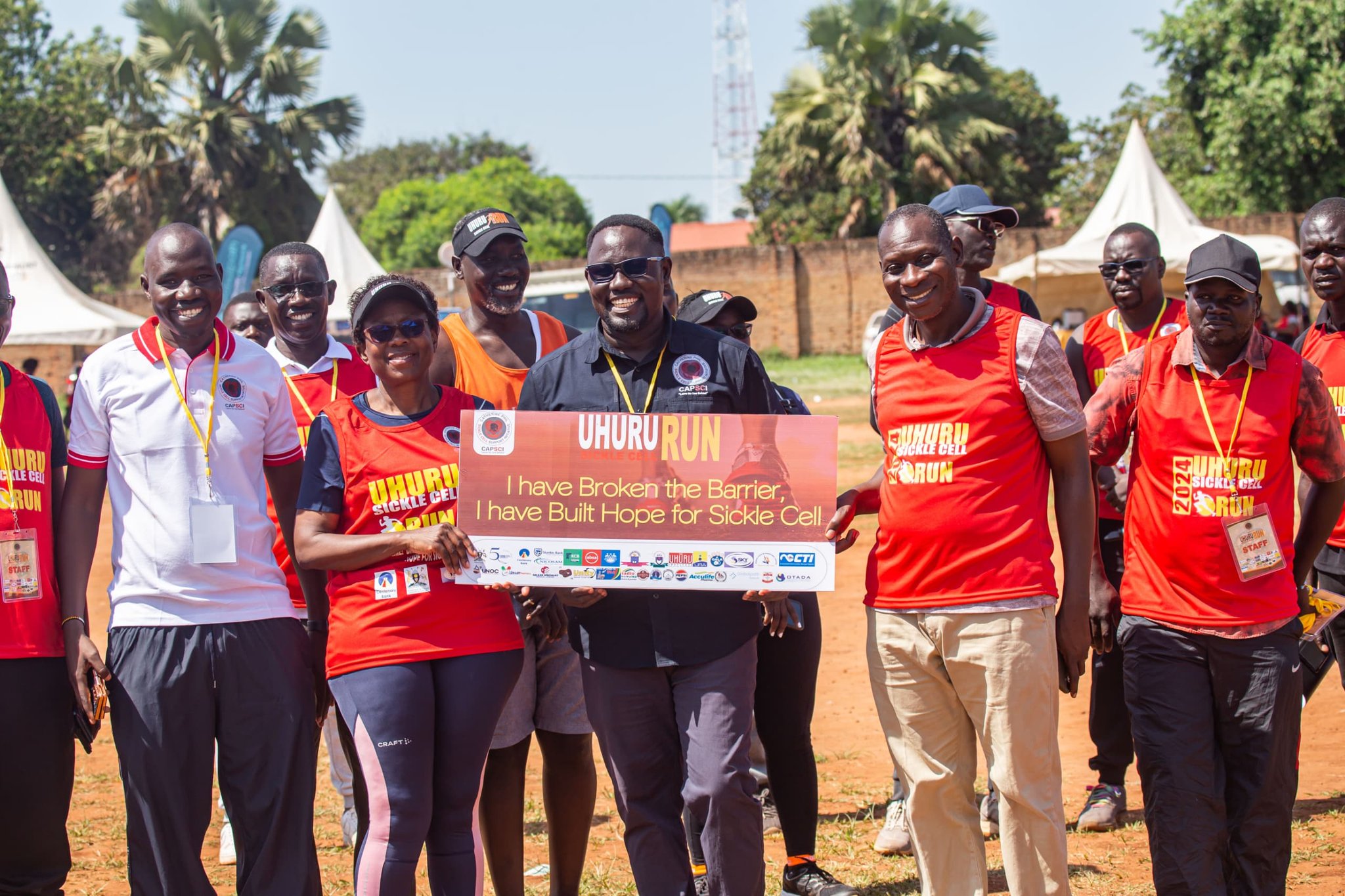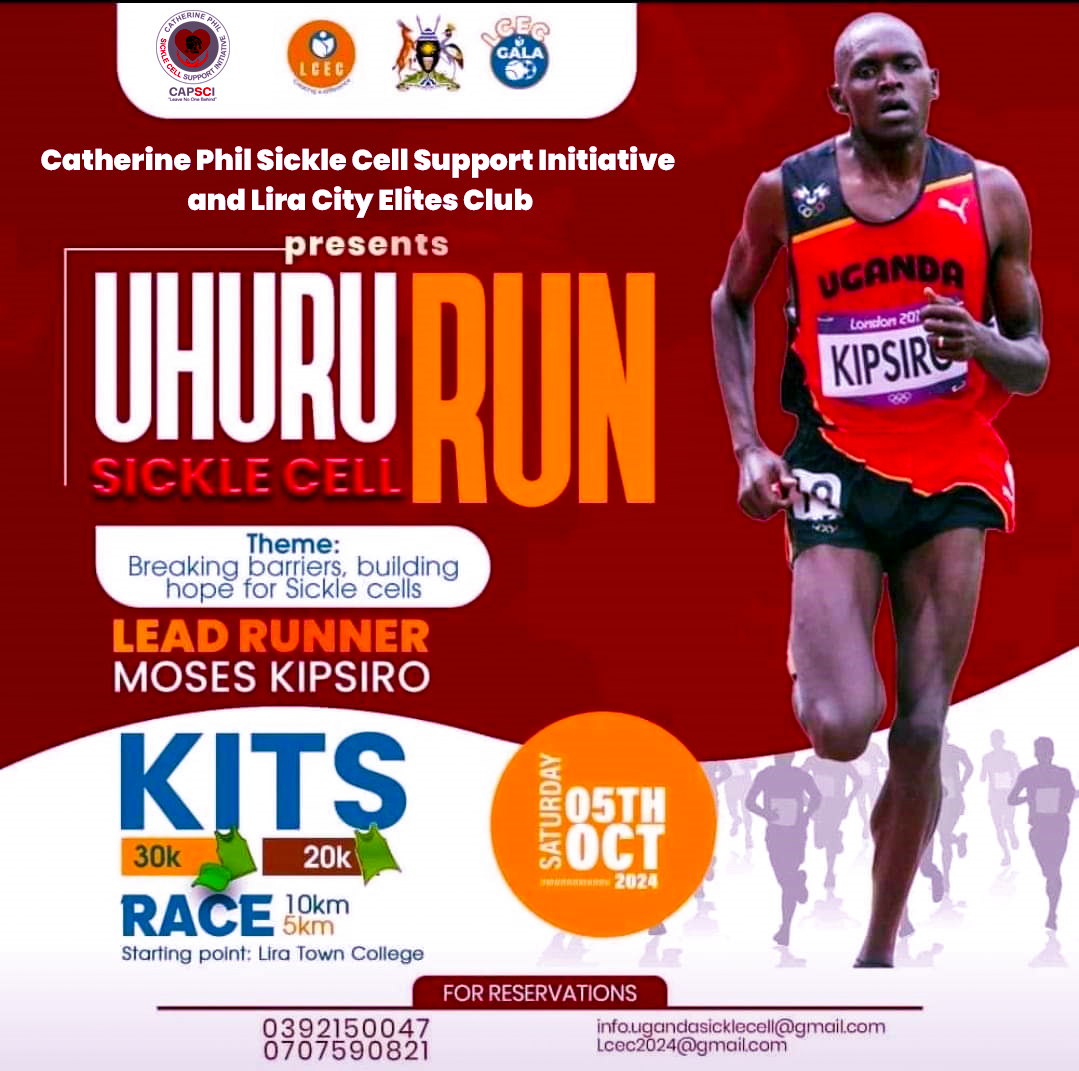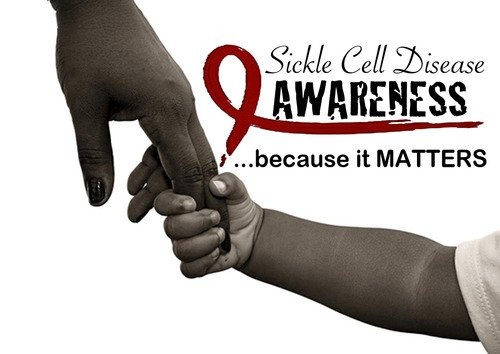Our Blogs

UHURU SICKLE CELL RUN REPORT-2024
Uhuru Sickle Cell Run 2024 , took place on the 05th, October,2024 in Lira City. Proceeds went towards other purchase of two Hb electrophoresis that was donated to Lira regional regional Referral Hospital and Alebtong District....
Read More
WORKSHOP FOR REVISING THE NATIONAL SICKLE CELL GUIDELINES, DEVELOPING SICKLE LONGTUDINAL REGISTER, CLINICAL CHART, AND PATIENT PASSPORT IS UNDERWAY AT RIDAR HOTEL, MUKONO.
Overview of the Workshop on National Sickle Cell Guidelines The ongoing workshop for the review of the National Sickle Cell Guidelines, which began on March 10 and will run until March 14, is taking place at Ridar Hotel in Mukono. This event has brought together a diverse team of specialists and advocates from across Uganda, all focused on improving the management and care of sickle cell disease (SCD) in the country. The workshop was officially opened by Dr. Jane Ruth Aceng Ocero, the Minister of Health and Lira City Woman Member of Parliament. Dr. Aceng has been a passionate advocate for sickle cell disease awareness and management over the past decade. Her commitment to this cause has been instrumental in driving significant changes within Uganda’s healthcare system regarding SCD. During her opening remarks, Dr. Aceng highlighted several key achievements in combating sickle cell disease in Uganda: 1. Establishment of Regional Centers: The country now boasts ten regional centers of excellence dedicated to sickle cell care. 2. Sample Points: There are close to 210 sample points across Uganda that facilitate testing and diagnosis for sickle cell disease. 3. Advocacy and Training: Dr. Aceng emphasized the importance of advocacy, commitment, training, and unity among stakeholders involved in sickle cell management. These developments reflect a concerted effort to improve healthcare services related to sickle cell disease, ensuring that patients receive timely diagnosis and appropriate care. Dr. Charles Kiyaga, the national sickle cell coordinator, addressed the necessity of having comprehensive guidelines in place for managing sickle cell disease effectively. He outlined several critical aspects: • Supportive Care: The guidelines are intended to provide a framework for supportive care that addresses both physical and psychological needs of patients. • Improved Diagnosis: Establishing standardized protocols will enhance diagnostic accuracy and ensure that patients receive appropriate treatment based on their specific needs. • Management Strategies: The guidelines will include evidence-based management strategies that healthcare providers can implement to improve patient outcomes. The workshop represents a significant step forward in addressing the challenges associated with sickle cell disease in Uganda. By bringing together experts and advocates, it aims to refine existing guidelines, develop a longitudinal register for tracking patient data, create clinical charts for better management practices, and establish a patient passport system that facilitates continuity of care. ...
Read More
APPRECIATION FOR SUPPORTING THE 1ST UHURU SICKLE CELL RUN ON SATURDAY 05TH. OCTOBER,2024 IN LIRA CITY
APPRECIATION FOR SUPPORTING THE 1ST UHURU SICKLE CELL RUN ON SATURDAY 05TH. OCTOBER,2024 IN LIRA CITY Warm greetings from Catherine Phil Sickle Cell Support Initiative, On behalf of the management and Board of Catherine Phil Sickle Cell Support Initiative. I am writing to express our heartfelt appreciation for the generous support that Centenary Bank extended towards the inaugural Uhuru Sickle Cell Run held on October 5th, 2024, in Lira City. Your commitment to enhancing healthcare in our communities is truly commendable. The event was honored by the presence of Hon Dr. Jane Ruth Aceng, the Minister of Health, who represented Mama Janet Kataaha Museveni as the Chief Guest. During her address, she applauded you contributions to supporting the health sector across the country. It is evident that your leadership and vision have made a positive impact on many lives. Thanks to your generous support, Catherine Phil Sickle Cell Support Initiative was able to acquire an HB electrophoresis machine. This vital piece of equipment will greatly enhance sickle cell diagnosis capabilities in our region, ultimately improving patient outcomes and facilitating timely medical interventions. I am pleased to report that a total of 50 million shillings was raised during this event. With these funds, we successfully purchased two machines which have already been delivered to Lira Regional Referral Hospital and Alebtong Health Centre IV. These contributions are instrumental in bolstering healthcare services for individuals affected by sickle cell disease. As we look forward to continuing this important work, I would like to extend an invitation for your participation once again in the second edition of the Uhuru Sickle Cell Run scheduled for next year in October in Lira City. This upcoming event aims to further improve infrastructure for care and management of sickle cell disease at Lira Regional Referral Hospital. Thank you once again for your unwavering support and dedication to improving health outcomes in our community. We hope to see you at next year’s event as we continue this vital journey together. Warm regards, Daniel Roy Odur Executive Director Catherine Phil Sickle Cell Support Initiative ...
Read More
Stanbic Bank Uganda Champions the Uhuru Sickle Cell Run
In a remarkable display of corporate philanthropy, Stanbic Bank Uganda has announced a generous donation of 10,000,000 Ugandan Shillings to bolster the forthcoming Uhuru Sickle Cell Run, set to unfold on October 5, 2024, in the vibrant city of Lira. This noble initiative, orchestrated by Catherine Phil Sickle Support Initiative, seeks to elevate awareness and secure vital funding for healthcare necessities concerning sickle cell disease in Uganda. The Essence of the Run The Uhuru Sickle Cell Run is primarily designed to raise funds for the acquisition of an HB electrophoresis machine, a pivotal tool for the precise and efficient diagnosis of sickle cell disease at Lira Regional Referral Hospital and Alebtong Health Centre IV. The presence of such diagnostic technology is indispensable in a nation grappling with the significant public health challenge posed by sickle cell disease. Sickle Cell Disease in Uganda The prevalence of sickle cell disease in Uganda is a critical concern, particularly in Alebtong District, which reports the highest incidence at 23.8 percent. Alarmingly, around 25,000 children are born with this condition each year, with a heartbreaking 80% failing to reach their fifth birthday due to related complications. These distressing statistics highlight the pressing need for improved healthcare services and awareness initiatives to combat this life-threatening ailment. Stanbic Banks Dedication Stanbic Bank Uganda's dedication to enhancing maternal and child health initiatives is a testament to its overarching corporate social responsibility objectives. By supporting the Uhuru Sickle Cell Run, the bank not only facilitates fundraising efforts but also plays an essential role in amplifying public awareness regarding sickle cell disease and its profound effects on families and communities throughout Uganda. ...
Read More
Sickle Cell Health Camp in Alebtong: A Remarkable Achievement
Our recent health camp in Alebtong on 26th and 27th July has made a profound difference in the battle against sickle cell disease. Over the course of two days, our dedicated team conducted tests on 210 individuals, uncovering 29 cases and 23 carriers. Day 1: A Promising Beginning The camp kicked off with a strong turnout on the first day, where 86 individuals were tested. This initial screening revealed 11 cases of sickle cell disease and 9 carriers, underscoring the urgent need for sickle cell awareness in the area. Day 2: Growing Participation and More Diagnoses The second day brought even greater participation, with 124 individuals tested. Unfortunately, this also led to a rise in diagnosed cases, with 18 individuals identified with sickle cell disease and 14 carriers. A Call to Action These statistics emphasize the critical need for ongoing awareness and access to sickle cell testing and treatment. Our health camp in Alebtong has made a valuable contribution, but the journey is far from over. The Need for Continued Support The high prevalence of sickle cell disease in Alebtong highlights the necessity for persistent efforts to address this health issue. In response, we are excited to announce the Uhuru Sickle Cell Run, set for October 5, 2024. This event aims to raise awareness and funds to enhance sickle cell testing, care, and research. Conclusion We extend our heartfelt gratitude to the Alebtong community for their support and participation in making this health camp a success. We are committed to continuing our fight against sickle cell disease and improving the lives of those affected. Join us in this vital mission by supporting the Uhuru Sickle Cell Run on October 5, 2024. Together, we can ensure that no one is left behind....
Read More
UNDERSTANDING SICKLE CELL DISEASE
What is sickle cell disease? Sickle cell disease is an inherited blood disorder. It is marked by flawed hemoglobin. That's the protein in red blood cells that carries oxygen to the tissues of the body. So, sickle cell disease interferes with the delivery of oxygen to the tissues. Red blood cells with normal hemoglobin are smooth, disk-shaped, and flexible, like doughnuts without holes. They can move through the blood vessels easily. Cells with sickle cell hemoglobin are stiff and sticky. When they lose their oxygen, they form into the shape of a sickle or crescent, like the letter C. These cells stick together and cant easily move through the blood vessels. This can block small blood vessels and the movement of healthy, normal oxygen-carrying blood. The blockage can cause pain. Normal red blood cells can live up to 120 days. But, sickle cells only live for about 10 to 20 days. Also, sickle cells may be destroyed by the spleen because of their shape and stiffness. The spleen helps filter the blood of infections. Sickled cells get stuck in this filter and die. With less healthy red blood cells circulating in the body, you can become chronically anemic. The sickled cells also damage the spleen. This puts you at greater risk for infections...
Read More
Lira City Sickle Cell Run: Let's Run for a Cause
Catherine Phil Sickle Cell Support Initiative, in collaboration with Lira City Elites Club, is hosting a sickle cell run on October 5th, 2024, in Lira City. The proceeds from this event will be used to acquire two HB electrophoresis machines (point of care) for Lira Regional Referral Hospital and Alebtong Health IV to improve diagnosis (Newborn screening) in the area. Every year, 25,000 children are born with sickle cell disease in Uganda. Unfortunately, 80% of these children do not live past their 5th birthday, and 20% struggle to access adequate healthcare services. Lango Subregion has the highest prevalence of sickle cell disease, with Alebtong district having a prevalence rate of 23.8%, which is higher than the national average of 17%. Given the information above, I kindly request your philanthropic support in raising funds to purchase the two machines by participating in our sickle cell run. A single vest is priced at 20,000, while a vest and a cap are priced at 30,000. Join us in spreading awareness about Sickle Cell through this run. We look forward to seeing all of you on the 5th of October 2024 in Lira City. Note Our lead runners will be MOSES KIPSIRO, and HON ACON...
Read More
Understanding the Risks of Passing on Sickle Cell Anemia: A Guide for Parents
How can I tell if I'll pass on the gene to my child? To have Sickle cell anemia, you must have two copies of the recessive sickle cell allele. But what about those with only one copy? These people are known as carriers. They are said to have sickle cell trait, but not sickle cell anemia. Carriers have one dominant allele and one recessive allele. Remember, the dominant allele usually overrides the recessive one, so carriers generally don't have any symptoms of the condition. But they can still pass the recessive allele on to their children. Here are a few example scenarios to illustrate how this might happen: Scenario 1. Neither parent has the recessive sickle cell allele. None of their children will have sickle cell anemia or be carriers of the recessive allele. Scenario 2. One parent is a carrier while the other isn't. None of their children will have sickle cell anemia. But there is a 50 percent chance that children will be carriers. Scenario 3. Both parents are carriers. There's a 25 percent chance that their children will receive two recessive alleles, causing sickle cell anemia. There's also a 50 percent chance that they will be a carrier. Lastly, there's also a 25 percent chance that their children won't carry the allele at all. Scenario 4. One parent isn't a carrier, but the other has sickle cell anemia. None of their children will have sickle cell anemia, but they'll all be carriers. Scenario 5. One parent is a carrier and the other has sickle cell anemia. There's a 50 percent chance that children will have sickle cell anemia and a 50 percent chance they'll be carriers. Scenario 6. Both parents have sickle cell anemia. All of their children will have sickle cell anemia. For more info please visit www.capsci-uganda.org I Call: 0392150047 I Email: info@capsci-uganda.org...
Read More
SICKLE CELL AWARENESS & SUPPORT
Every First Sunday of the Month | Lira Town College Playgrounds Experience our exceptional services and be part of a supportive community dedicated to making a difference in the lives of those affected by Sickle Cell Disease. Through sports, we promote awareness ...
Read More
SHATTERING THE STIGMA: BREAKING DOWN BARRIERS FOR SCD WARRIORS
People with Sickle Cell Disease (SCD) face physical pain, fatigue, and harmful stereotypes. They're not "lazy" when they miss school or work; they're fighting for their health. Let's educate ourselves, offer support, and advocate for inclusivity. Together, we can break down barriers and empower SCD warriors to thrive!...
Read More